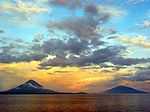Spanish 1/Chapter 9 (Recreation & Lifestyle)
< Spanish 1Chapter 9 (Recreation & Lifestyle)
Lifestyle
- baile - dance
- concierto - concert
- fiesta - party
- partido - sporting match, game
Recreation
- ir a ... - to be going to ...
- ir de cámping - to go camping
- ir de pesca - to go fishing
Sports
- jugar al básquetbol - to play basketball
- jugar al béisbol - to play baseball
- jugar al fútbol - to play soccer
- jugar al fútbol americano - to play football (American)
- jugar al golf - to play golf
- jugar al tenis - to play tennis
- jugar al vóleibol - to play volleyball
- sé - I know
- sabes - you know
Emotions
- cansado(a) - tired
- contento(a) - happy
- enfermo(a) - sick
- mal - bad, badly
- ocupado(a) - busy
- triste - sad
Time phrases
- ¿A qué hora? - At what time?
- a la una - at one o' clock
- a las ocho - at eight o' clock
- de la mañana - in the morning
- de la noche - in the evening
- de la tarde - in the afternoon
- este fin de semana - this weekend
- esta noche - this evening
- esta tarde - this afternnon
Words to accept or decline invitations
- conmigo - with me
- contigo - with you
- puedo - I can
- puedes - you can
- ¡Ay!¡Qué pena! - Oh! What a shame!
- ¡Genial! - Great!
- lo siento - I'm sorry
- ¡Oye! - Hey!
- ¡Qué buena idea! - What a good idea!
Words to want something
- quiero - I want
- quieres - you want
- ¿Te gustaría? - Would you like?
- Me gustaría - I would like
- Tengo que ... - I have to ...
Other words
- demasiado - too
- entonces - then
- un poco - a little
Jugar (to play)
In Spanish, the verb jugar means to play. Like ir, it conjugates irregularly. It is a stem changing verb, meaning that its root changes form. In the word jugar, the -ar is the conjugated part, while jug- is the stem.
- juego - I play
- juegas - you play (singular)
- juega - he/she plays
- jugamos - we play
- jugáis - you play (plural)
- juegan - they play
Vocabulario adicional
- equipo de ... ... team
- práctica de ... - ... practice
- reunión de ... - ... meeting
- reuniones de ... - ... meetings
Cultural Insight (Soccer)
In many parts of the world, soccer or football is the most popular sport. In Spanish-speaking countries, fanatic fans often crowd stadiums or sports bars to watch their favorite team play. Games are sometimes taken seriously and brawls are often started in serious games. Many students at school usually play soccer during break or after school.
Country Focus (Nicaragua)

Nicaragua (Spanish: Nicaragua) is a representative democratic republic and the largest nation in Central America. It is also the least densely populated with a demographic similar in size to its smaller neighbours. The country is bordered by Honduras to the north and by Costa Rica to the south. The Pacific Ocean lies to the west of the country, while the Caribbean Sea lies to the east. Falling within the tropics, Nicaragua sits 11 degrees north of the Equator, in the Northern Hemisphere.

The country's name is derived from Nicarao, the name of the Nahuatl-speaking tribe which inhabited the shores of Lago de Nicaragua before the Spanish conquest of the Americas, and the Spanish word Agua, meaning water, due to the presence of the large lakes Lago de Nicaragua (Cocibolca) and Lago de Managua (Xolotlán), as well as lagoons and rivers in the region.
At the time of the Spanish conquest, Nicaragua was the name given to the narrow strip of land between Lake Nicaragua and the Pacific Ocean. Chief Nicarao ruled over the land when the first conquerors arrived. The term was eventually applied, by extension, to the Nicarao or Niquirano groups that inhabited that region.
The Nicarao tribe migrated to the area from northern regions after the fall of Teotihuacán, on the advice of their religious leaders. According to tradition, they were to travel south until they encountered a lake with two volcanoes rising out of the waters, and so they stopped when they reached Ometepe, the largest fresh-water volcanic island in the world.
Nicaraguan culture has strong folklore, music and religious traditions, deeply influenced by European culture but enriched with Amerindian sounds and flavors.
Factbox:
-Official Language: Spanish
-Other Languages: English, Native American languages

-Capital: Managua
-Government: Democracy
-Area: 120,340 sq km (50,193 sq mi) (98th)
-Population: 5,891,199 (110th)
-Religion: Christianity (Catholic 58.5%, Protestant 23.2%, Jehovah's Witnesses 0.9%) 82.6%, Non-religious 15.7%, Buddhism 0.1%, other (Islam, Judaism, Animism) 1.6%
-Human Development: 0.699 (124th, MEDIUM)
-Independence: September 15, 1821
-Currency: Córdoba